#its like finding out disco elysium was a ttrpg setting. like with that level of love and detail in the worldbuilding ofc it was
Explore tagged Tumblr posts
Text
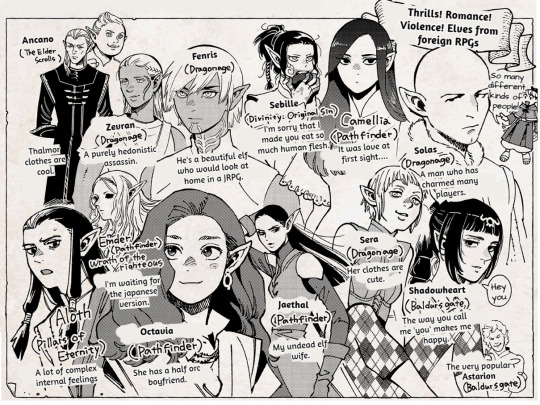
TIL Ryoko Kui is a pathfinder enjoyer
#and that she really likes dark-haired half elves with poorly-concealed secrets lol (shadowheart & camellia)#so fun when 2 of my fav things intersect accidentally. but also of course she likes crpgs she wrote DUNGEON MESHI#its like finding out disco elysium was a ttrpg setting. like with that level of love and detail in the worldbuilding ofc it was#also i love how completely disinterested she is in astarion in the corner lmfao#ryoko kui#dunmeshi#dungeon meshi#bg3#pwotr#pathfinder kingmaker#dragon age
26 notes
·
View notes
Text
April 2025 Wrapup!
This month, I focused on me, and that meant writing about things I mostly wanted to write about and wanted to share with you because I think they’re cool and I think you’d think they’re cool. Come read, see, you might find something new you love!
Game Pile:
Libertalia: Wings of Galecrest, one of my new favourite board games, which I finally! got! to! the! table!
Quest For Glory I-IV, turning the four articles I wrote on these games years ago into an accessible experience and updated some of the wording and ideas.
The First Hour of Disco Elysium, where I contemplated just the initial experience of playing Disco Elysium. It’s a really engaging game, it’s an incredible joy to play, but also, it’s something almost nobody has meaningfully explained. ‘Why play Disco Elysium’ is a question that most people respond to by either gritting their teeth about the finale, or just effusing about the premise, neither of which work as ways of getting you past a bit of a brick wall of ‘why are you even trying’ opening.
I Can Be Normal About Selaco, where I played one game so much for this month that I not only ran it out of material (100% secrets on all levels), I also ran out its minigames to the best of my ability. Selaco is one of my favourite games I’ve played all year, and even the ways it fails its legacy are still ideas I think are worth trying.
Story Pile:
Gleipnir, an incredibly horny, violent gory action manga. I really enjoyed this one, to my surprise, and I love finding things like this; complete, finished manga that get to run their course and tell all the parts of their story they want to. Manga is such a great format for this kind of story, too, where the pace of release allows for both speedy and abrupt paces in narratives, and very dark, conscious genre shifts.
Hundreds of Beavers, a live-action Looney Tunes cartoon that I’ve been recommending as much as I can to anyone I know who likes practical effects, despite the movie being 80% green-screen by volume.
Keasbey Nights by Catch-22, an album of songs I already knew by a band I already liked, in a primal, and primeval state. Basically, it’s things I knew, mixed worse, and somehow all the stronger for it.
X, by Daniel Sloss, a comedy show about getting guys to pay attention and relate to the host as he drags them along into analysing his own toxicity and his own limits as a guy, and then the things that those limits made him bad at doing and bad at helping.
Dev Diary:
14 — Generative Art as Intuition Pumps. I used a free generator to make some images in class, then critically examined those images.
15 — Time Exchange in Wyrmspan. After playing the game Wyrmspan I dedicated thought to the idea of managing time in the game mechanics of Moonshiners and Bloodwork.
16 — Playtesting Results. Did some playtesting, wrote about it.
17 — The Guff You Gather. Article on the sets and components in Moonshiners and how they’re going to proliferate ot.
18 — As Yet Unpublished. Hopefully, this will be the print-and-play of Moonshiners I’ve been working on all month, but it goes up tomorrow, so who can say.
I think it’s only natural as a big dorky fan of TTRPGs and specifically of Dungeons & Dragons 4th edition (with an nunecessary amount of expertise in 3rd edition I find worth sharing), my month should focus on an unnecessary amount of D&D based material. For example, I talked about the explosive potential of the Artificer (with a rules misunderstanding that I mention at the bottom of the article – turns out I’d forgotten the even cheesier trick of use magic device spoofing metamagic feats). I also ruminated on what decoupling the Druid from the Cleric’s space permitted, with the mysteries of the druid. I wrote about something generic in Cobrin’Seil that you should feel free to poach for your setting, the Fluttering Groves, with their moth-people, ooze-people, and chitin-people, who all represent a kind of material version of pluralisation, and the specific anarchist pirate state of Mertzenne.
While talking about worlds and world building, I reflected on the way that magic rules get regulated and enforced in settings, and I even did a different kind of How To Be where I instead approached the characters as level 1 puzzles, and focused on the narrative questions I would use to engage other players and the GM, while contemplating the really good (first season of) Arcane. A final dash of TTRPG rumination was brought to bear on the nearly impossible task of making a good Pokemon RPG.
I wrote about Homestar Runner fanfiction, which I wrote before the brothers chaps released a 25th anniversary recommendation to go back to a websiiiite, which you are doing, if you’re reading this. I also put together some words on the Locked Tomb and its relationship to the composition of a person, who, in universe, is largely regarded for their decomposition. Eyyyy. Then I wrote about my birthday, but don’t worry I also wrote about the Autobots’ crab-shaped wetwork expert, in order to make sure I didn’t explode from being too serious on the internet.
I made a shirt for the new semester. It’s been in and out of Redbubble jail. It’s also a type you absolutely do not want to buy, so I won’t bother linking it.
It’s my birthday as I write this. I took it very easy today. I got up, I went to the grocery store, and I came home with lunch. Then once I was home, I marked student work for a few hours, then did two hours of PhD work, and then watched some Russ Reviews talking about Beverly Hillbillies with Fox. My dad and mum dropped around, and then my mother in law. I walked the dog. I got some pants and some pepsi for my birthday.
It was so wonderfully nice. So very chill.
This month has had a chunky break in it and I’ve really appreciated it. Starting tomorrow I expect to get more students asking me questions, and that’s fine for then. We’re going to have to approach May one step at a time.
I still have an incredibly important writing project to do, though. Working on that.
Check it out on PRESS.exe to see it with images and links!
10 notes
·
View notes
Text
Finding My Ideal TTRPG
Of the many things I can say of Disco Elysium, the thing that strikes my gamer brain right now is the system. At its simplest, it's 2d6 + Skill. The gear you wear gives skill bonuses. You can have "Thoughts" that also give bonuses.
In my mind, it's perfect. It's all I need. A skill list and some dice. It's how I ran 5e for so long. But a lot of the 5e skills are boring. And it's not possible to just steal the Disco Elysium skill list and use it, because a lot of it is specifically about being a cop and specifically about being the kind of cop that Harry is.
But I think a good place to start would be to ask similar questions. For instance, if I wanted to make a dungeon crawler that was "my perfect ideal of a dungeon crawler," I could ask "what skills would a dungeon crawler possibly need?"
A question like that might get you a few of the same skills in 5e. But I think the question suffers from being not only too broad, but too boring. The question is flawed because as we've seen over the last 30-40 years is that there are a lot of different ways to do a dungeon crawler.
Troika! isn't The Nightmares Underneath isn't Cyberpunk Red isn't blah blah blah.
I think about Venture from Riley Rethal a lot. One of the Paladin's "Strong Moves" is simply "Kill someone." I imagine a skill list with "murder" on it. Such a strong word to use, but it's a choice. And choices are more important to me than trying to hit a common denominator.
A skill like "Pray" would be open enough but also says something about the world. I think in a game like this, your chosen skills would be the answer to choosing a class. There wouldn't be combat rules beyond roll dice + skill to do a thing. What you do with your skills is the important choice. It's roleplaying.
I'm not sure where I'm going with this. Kinda losing my train of thought. I'm thinking about how "Thoughts" would work as ways to expand your character. Clocks from BitD would work well to emulate the progression of time, and they're a tool I've used in my dungeon crawler games for a while now.
Essentially, whenever a player wants to learn something. Anything. I have them figure out *how* they're going to learn it, and then I make a clock. And whenever they get the time to sit and work on that thing, we fill in a slice of the clock.
It's a very organic way of growing a character beyond a set level progression or needing to gain EXP at all. Clocks can be filled with time or money. "Pay the thief 50g and she'll train you for the day," or whatever.
You'd never run out of Things to make for the game, because you could just work out more Thoughts, deepening your worldbuilding with them, and giving them in-game benefits.
Gear is another thing that I think would be improved. Y'know, a sword could give you +1 Fighting or Murder, but it might also give you +1 Cool, or a bonus to your negotiating skill. What you wear is more important than Armor Class bonuses or whatever. What you wear would increase or decrease skills. It would *say* something about your character.
A few other things I think about in regards to conceptualizing my "perfect rpg":
The way Pokémon games handle a Pokémon's stats. Attack, Defense, Special Attack, and Special Defense. It's nice and simple and if they were included (reworded of course) in a bigger list of skills, it would help to put choices on an equal footing. If choosing between diplomacy and combat were as easy as putting skill points into particular skills, the choice is on you to decide how you interact with the world.
The skill list determines the various ways "Dungeon Crawler Persons" interact with the world, just as the Disco Elysium skill list shows the various ways a cop like Harry might interact with the world. The skills you choose then are you deciding how to interact with that world. They open and close different doors. Put barricades in your way. Remove others.
Anyways, these are just my rambles right now. I've been thinking about this shit for a while. I've probably tweeted about it before too. It's something I've tried to incorporate into .dungeon//remastered and it's what I plan on incorporating into whatever is next.
Thanks for reading.
81 notes
·
View notes
Text
I’ve recently started playing Pathfinder Wrath of the Righteous and I’ve fallen in love, same as I did when I played Kingmaker. And I’m wondering if there are any isometric RPGs I should pick up during the Steam Summer Sale that can scratch that same itch. But I don’t think I’ll get the luck I’d want going through store pages and reviews to try to figure out what games are most similar to the Pathfinder ones in the ways I most like them. Should I get one of those Divinity or Pillar of Eternity games I’ve heard about. Or should I go back to the oldies that the Pathfinder Adventure Path adaptions are trying to be the spiritual sequels to. So I’ve decided to write out what my favorite parts of the games are, so people on tumblr can give me recs.
1. Companions. I’ve gotten a sense that some isometric RPGs tend to be solo adventures, or you can only have one companion follow you at a time. When I looked up “isometric RPG” I got the original Fallout games, and I know you’re not traveling around with a party. I want a game that’s you controlling several guys when you explore and fight, basically a way to play a Tabletop RPG on your own time.
2. Story. This is my other essential. I don’t care about voice acting or graphics. But I want a story rich game, one that doesn’t have a high suspension of disbelief and a good amount of nuance. And for the main PC, either let me build a personality for them and influence the story with my choices, or have the game provide me with a personality. Don’t give me your Dragon Ages, where to my understanding, the fans are always cringing about the writing and its bad implications. I can understandably accept some stuff that didn’t age that well from the old Dnd ones, but that shouldn’t be a big part of the story- such as if there’s racist Orc worldbuilding, it should only be featured in a sidequest. I’ve already played Disco Elysium, loved that as well.
3. No “permadeath” (permadeath is in quotes, because with the default settings in the Pathfinder games, you can still use resurrection spells). I have no idea how common this would be in these games, it might just be Pathfinder trying to transfer its punishing reputation into its default settings. The Pathfinder games have a lot of difficulty settings, and one is changing the death mechanics from how they normally work in the system to have your characters revive at the end of an encounter. I really do need it. But the main reason I turn it off, is because unlike a TTRPG, the game can’t properly react to a companion dying. You won’t get a new character to replace them, and you might miss out on their companion quests. In general a highly customizable difficulty would be nice, but not required.
Those are my essentials, but here are the things that I’ve loved about the Pathfinder games.
4. A sense of a wider world. The Pathfinder games and the Adventure Paths they’re based on feel like they’re set in so much more real of a world than other games I’ve played. When a character references another nation, that place has also been developed. The use of the wider Golarion setting can be felt. My first thought was that I would be only able to find this in the DnD based games, but the games with original settings could also feel like they exist in a wider setting- one created with care. Disco Elysium, with all its references achieved a similar effect.
5. Complexity. Again, this made me think of the DnD based games. You can end up with a lot more content with someone else already made the base mechanics for something else. But I don’t really need full Pathfinder level complexity. I’ve never played the game IRL. What I really want are a lot of classes and a lot of spells.
And this last one is the most optional:
6. And extra element in addition to adventuring. The two Pathfinder Adventure Paths that have been adapted- Kingmaker and Wrath of the Righteous have both had another element, probably why they were chosen- they were the ones that would be able to benefit the most from the pros of a computer GM. Kingmaker has the management of the aforementioned kingdom you’re trying to found, and Wrath of the Righteous has you managing a crusade- there are tactical RPG and city building elements in this one. I enjoy this extra variety to the core gameplay loop and the wider perspective this requires you to have. So if there’s another game where you have to manage something like that- a kingdom, an army, a guild, that would be a nice bonus.
I’m excited to hear your recs. Also you should play Pathfinder Kingmaker and Wrath of the Righteous, it’s got all the stuff I just described. Don’t let the complexity of Pathfinder scare you off, the computer takes care of most of it.
#game recs#isometric rpgs#pillars of eternity#divinity#baldur's gate#pathfinder kingmaker#pathfinder wrath of the righteous#planescape#icewind dale
28 notes
·
View notes
Text
Disco Elysium (2019) - A Review and Analysis
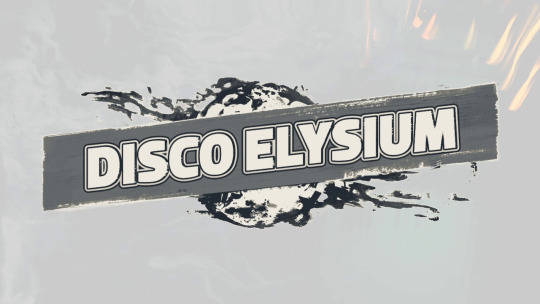
A postmodern role-playing game for a much different audience. A combination of skillful artistry and unfulfilled potential. An attempt at tackling difficult topics and pandering to different tastes. A full package, with deceptive contents...
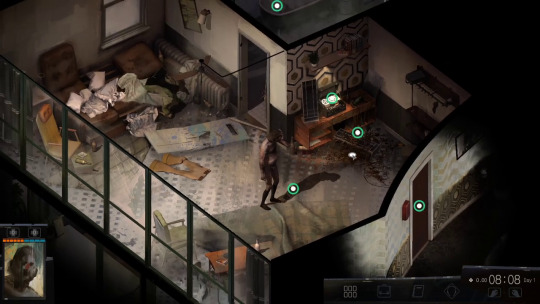
I enjoyed playing through Disco Elysium, but for completely different reasons than those that initially sold the game to me. Going in, I believed that it would be the type of RPG that I had been looking for quite some time – one that is not burdened by most of its interaction with the world happening on a grid, scanning through a list of spells and abilities, franticly pausing every frame, trying to min-max numbers as to not get destroyed by a pack of menacing farm animals of a slightly higher level. Examples of that in the genre would be classics such as Baldur’s Gate or newer re-iterations like Divinity: Original Sin and Shadowrun: Hong Kong. What I would habitually find myself doing is picking up the game, sinking my teeth into it, eventually hitting a numerical roadblock in some quest, and almost immediately retiring to a life of “not playing that game ever again”, as I am faced with the option of either save scumming and beating my head against the numeric wall, until by some fluke of the numbers I get the “good” number and am allowed to proceed; or could just stop doing whatever thing I am currently invested in and go somewhere else on the map, where the numbers are not as disagreeable, so I can get my personal numbers high enough to where the numbers I was having difficulty with before seem less impressive and I can pick up that quest again, but this time only halfway through, struggling to remember contextual cues that were relevant perhaps a few hours ago, but are now a forgotten footnote in some journal entry.
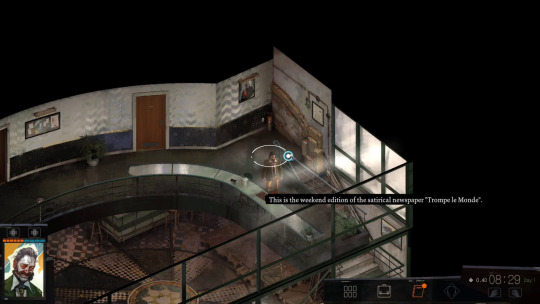
In both cases, the immersion gives way to the idea of gameplay, as the perhaps flawed ideal of an RPG is that which is based on table-top role playing games, such as Dungeons & Dragons, the aforementioned Shadowrun, or anything else that follows the same formula. From my personal experience in TTRPGs, the same issue persists, namely in having meaningful choice and character development take second fiddle to massive 3-5-man 1-2-hour combat encounters in between the more immersive moments of dialogue between players, non-player characters or story development. I’ve always felt that combat is so abstracted from everything else in TTRPGs in the way that it suddenly shifts into an entirely different game, which unlike the elements of role-play is less free-form and bound to a rigid set of rules. You’re no longer interested in how things look, feel or act, but rather how large a number is on a sheet of paper; and this contention of mine seems to always be translated into the video game counterpart of this genre, carrying the same problem from one medium to the other. Games even seem to compound upon the issue, by putting you in charge of multiple characters, where your custom created character is somehow not only equal to them, but at the same time the savior of the universe and all that is holy.
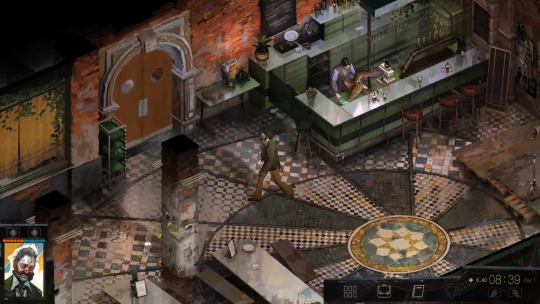
I cannot help but believe that the party ought to be AI controlled pawns, considering that they are supposedly different people with their own goals and aspirations; thus leaving the player to micro-manage their singular character – their avatar in the game world, rather than developing a form of psychogenic schizophrenia by having to deal with each and every one of the party’s members (now, admittedly the remakes of both Baldur’s Gate games have such a feature, but the combat AI is so poor, that you still have to go and remind them that they actually have a whole list of spells that they could be, in fact, using to… for instance, heal you, as you sit there bleeding profusely, crippled and powerless on the ground).
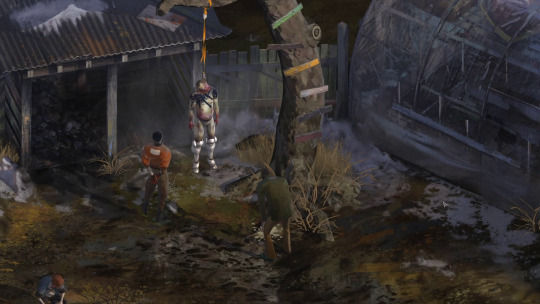
The only games which I have seen managing combat and RPG elements successfully are listed as a fundamentally different genre, known as “immersive sim” or “0451 games”. To name a few, that would be games like those of the Deus Ex, Dishonored and even the Fallout series. Most of those are first-person, for the most part shooters, with some emphasis on a singular character’s development through dialogue and stat point distribution. My main point can roughly be exemplified by comparing the naming convention and the reality for both genres: one is a “role-playing game”, the other is an “immersive simulation”; the first being used deceptively, as you could be playing a multitude of roles at any given time and also suspending that role-play to participate in some rather lengthy tactical combat for what could be 50% of the game’s runtime. On the other hand, you have “immersive sim”, which according to Warren Spector (game designer of Deus Ex and Thief fame) is a game in which “you are there, [and] nothing stands between you and [the] belief that you're in an alternate world”. I simply cannot emphasize enough how even the most engaging narrative and the most skillful writing can be tarnished by this type of abstract combat, which feels so fundamentally foreign and somehow still intrinsic to the idea of role-playing games and immersion.
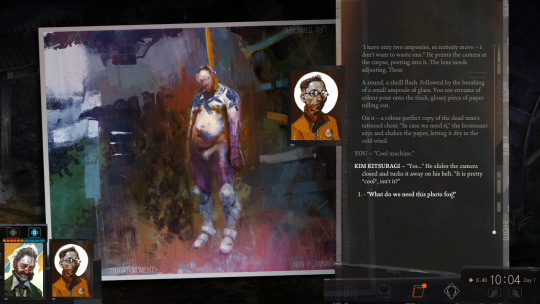
Disco Elysium seemed to be the odd one out – a RPG that has no combat, except that, initiated by your choices in dialogue (more akin to playing an animation than actual combat). It was also advertised to me as having quite an in-depth ideological system, that was affected by your choices in-game and would automatically adapt dialogue according to your flavor of politics, philosophy or culture through a series of thoughts, which you would internalize, if used often enough. Frankly, it seemed like wish fulfilment for a jaded immersion-loving straight-edge centrist such as myself.
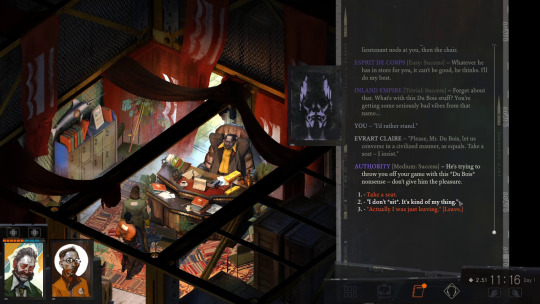
Upon launching the game, I was quickly introduced to the persona that I would be inhabiting – a deranged, drunken amnesiac, who in some cases would pass as a cop, but only if one’s notion of law-abiding is that of a drug-fueled abusive lover; also known as - the farthest thing from me. I already knew that my journey through the game would be that of a redemption arc, where this horrible piece of shit human, was going to become the most squeaky-clean, drug- and alcohol-free centrist known to all of Revachol. A true test of the game’s systems in action – from deranged and corrupt, to the straight and narrow. To my eventual surprise - I could do all of it, and very successfully at that. By the end of my nearly 24-hour playthrough, I had achieved my ideal vision for the character, with only a bit of resistance, which I will briefly mention further down the line. For now, I had succeeded in using all the tools available to me in order to internalize the thoughts for centrism, rejecting any form of drugs, and by the end almost managing to squeeze in the time to internalize being sober, cut short due to the spontaneous conclusion of the game.
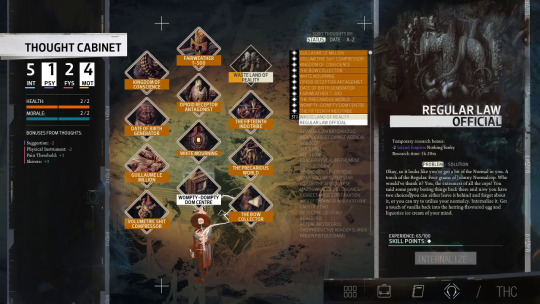
The thoughts system was not entirely what I had initially imagined. Namely, what I had envisioned was a system, which converts whatever responses one made throughout the game, into non-internalized thoughts, which would begin to alter the dialogue options available, and only after choosing to emphasize said options, would it eventually internalize and give you a lot more radical options based on said thought. What it would turn out to do instead is make the acquisition of thoughts work in a similar manner, but make the process of internalization a menu, in which you “equip” thoughts into available slots. It seems like a minor inconvenience, but it makes the thoughts feel like yet another item that you just set and forget, rather than the thoughts of a person being actively developed over time, based on what kind of discourse they engage in. I suppose the idea of having it take anywhere from thirty minutes to six hours to internalize is there to be the substitute for the drawn out process of internalization. It is in a way saying “I feel like turning into a centrist in the next thirty minutes.”, while going around doing investigative work around a crime scene. The more active process I envisioned, would indeed take a lot longer, but it would be massively more immersive, as more and more options become available to you over time, rather than after some arbitrary timer has gone down.
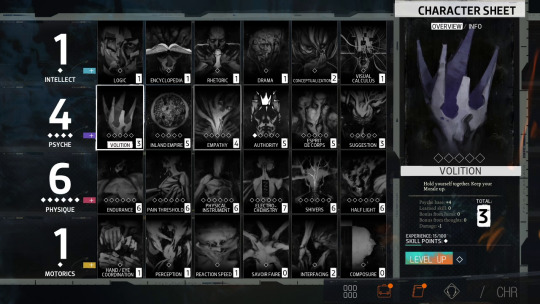
Another big detractor is having to use skill points to unlock new slots for thoughts, which would otherwise be put into your more practical skills. Theoretically, one would think a human has an almost infinite capacity for new ideas; and one is surely not going to want to internalize them all. A good example would be the “Volumetric Shit Compressor” thought you gain early into the game, which mainly fulfils its purpose in one skill check for less physically able characters as a part of a single quest and is never made use of again, beyond its flat stat bonuses. No other thought in my playthrough had a temporary pragmatic function like that, which feels like a missed opportunity. Its temporary nature is where the skill-point cost seems absurd, when they could be better used to improve one’s skills. In what way would the character becoming more skillful help them stop “getting their shit together”? Wouldn’t one discard the though immediately after it’s no longer useful? The way the system works currently, meant that I spent most of my points on slots and playing around with thoughts, rather than improving my character until the very last parts of the game, which in effect made the game more difficult than intended. The decision to make thoughts equipable and not persistent passive perks that can upgrade into more radical or complete versions of themselves is perhaps one of my main disappointments with the game. The effect on scope would be minimal, as the game already has the dialogue options for those thoughts written and would only need to change their acquisition and internalization to be less menu-driven and more player-driven.
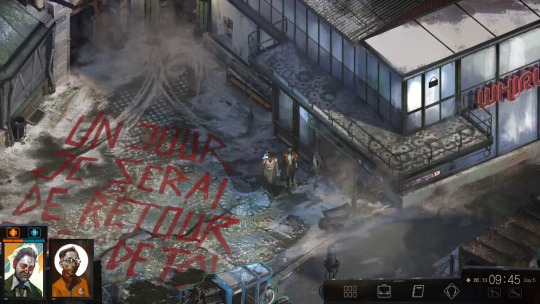
I tangentially mentioned not having skill-points to freely use until the latter parts of the game: That in turn made skill checks a lot more difficult and perilous, by making white skill checks (ones you can fail and retry upon increasing the skill they require) harder to re-unlock once failed and making red checks (ones that you cannot retry once failed) almost impossible, if not clothed in every stat-boosting piece of apparel in one’s inventory or seasoned with every potentially hazardous bottle of booze or glowing fairy dust left lying on the ground. White checks also do not unlock after one has used a consumable item or changed a piece of clothing to boost said stat, which encourages save scumming, as there is no way to change clothing in the middle of dialogue or knowing what the skill check will be, leading to one of the many pitfalls which I described earlier.
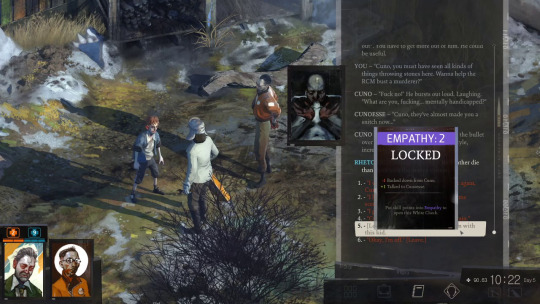
An even greater fault is that some quests just drop dead in their tracks, if the stat check is not completed. Moreover, since one cannot be proficient in all four skill categories, I would regularly hit a brick wall, upon being faced with a Psyche or Physique skill check, as my character mainly specialized in Intellect and Motorics. The thing about hitting a brick wall in Disco Elysium is not so much that you fail and have to face the consequences, but rather cannot continue at all and the narrative stops dead in its tracks until you can succeed the check. Sometimes quests are tied to each other, so not being able to progress in one of them means that you can’t progress in any of them. Suddenly an entire quest chain can just be gone at the click of a button. It got to a point where I would prefer to hear that all my efforts were in vain, fucking everything up irreversibly, rather than having a white check get locked and sit there in my journal, waiting for me to miraculously gain five points in some sub-skill of Physique. One way to fix this would be to have more obfuscated red checks with uncertain odds that lead to failure states. At least that would be more immersive than the current offering, as one could live with the consequences, rather than be left guessing what it could have been if one had slightly higher skills. This, however, could be difficult, as there is a dice roll to every skill. Not being skilled merely means you have less of a chance of succeeding or, alternatively, a higher chance to fail and lock the skill check.
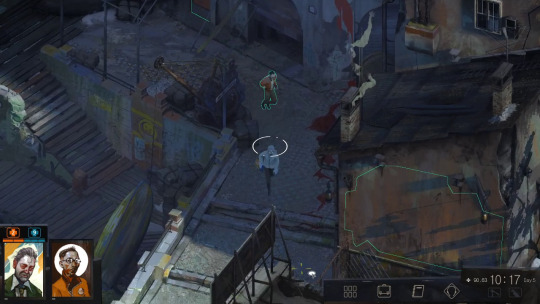
The one thing that the game does great when it comes to skills is the addition of secret tasks. If one were to follow particular lines of inquiry, they often lead to some skill check down the line becoming easier, due to the things learned beforehand about that topic. This system rewards being thorough and attentive and is, perhaps, the best feature of the game. However, observations made through the “shivers” system (where orbs of information will show up contextually above the protagonist’s head, revealing information about the environment or elaborating on something relevant) do not appear to factor into these skill checks. This often leads to you reading something important when it pops up in the overworld, but upon engaging someone in conversation one must often select benign lines of dialogue, acting like one hadn’t made those observations to begin with. The dissonance is even more infuriating whenever Kim (your companion throughout the game) tells you that you are obviously wrong, because he also made those observations but (unlike you) could talk about them. It would have been a lot more diegetic if there were dialogue options available for you to repeat the observation to Kim instead, perhaps as you talk to him in the overworld (a feature that is woefully underutilized, and shows the same five or so options throughout the entire game, except whenever Kim wants to talk to you about something he deems relevant – an ability, which you would think the player should have had as well).
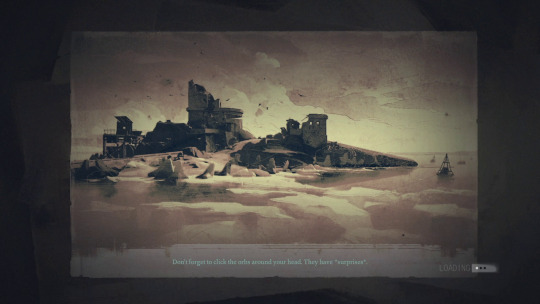
Speaking of the overworld, Disco Elysium does quite a lot with the small real-estate it has on its map. For what feels like a small neighborhood, it packs tens of hours of content, a varied cast of characters and lots of places to explore. Walking around is encouraged by the game, almost to a fault. At many points during the game Kim will remark upon your seemingly absurd ability to run around without getting tired. There even comes a point where you are injured, and are told not to run to avoid further harming yourself. After about twenty hours I realized that this was in order to signal to the player that if they run all over the place, trying to finish everything as quick as possible, they would be left with a lot of extra time at the end of the day, which would have been perhaps better spent looking into side-quests or other optional activities. However, the walk speed is woefully slow and with the amount of backtracking one needs to do, means that you will be seeing the same places plenty of times, which only tempts you even more to not waste your precious time RP-walking. The game has benches, which you can use to pass the time, but they are only available whenever Kim is not with you, which is only durring the night, meaning you can’t make any meaningful progress by resting on one, effectively making them worthless. That and the presence of time-gated tasks, means you will most likely be trying to find ways to waste your time, prompting Kim to berate you even more for straying away from the main focus of the narrative, as he often does. If you’re a fast reader, the game luckily fast-forwards time based on how many options you’ve selected, rather than real-time. This is most apparent whenever you’re save scumming and going though entire trees of dialogue you’ve already read.
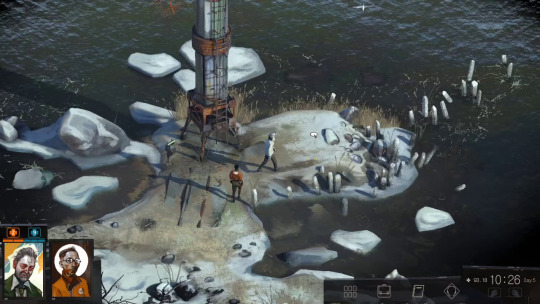
And you will be reading a lot, as this is what you signed up for when you relinquished the combat systems of your typical RPGs. A welcome change, I might add, as the dialogue is beautifully written and engaging for tens of hours. (The end credits even thank Chris Avellone for what is probably him lending a bit of his Midas touch when it comes to game writing.) However, there are of course flaws in the way Disco Elysium decides to portray some of its characters, as it is sometimes more interested in making political statements in a very one-note way that might shock some people, rather than what one would think are nuanced and fleshed out personas. A large part of the cast is wearing a thick layer of existentialism, which they seem to flaunt upon every given opportunity. The same goes for characters who clearly exhibit some variety of political radicalism; you’ve got your racist nationalist, your bourgeois-eating communist, your fence-sitting centrist (dubbed moralist) and a whole swath of colorful opinionated people whom you either interact with or endure. Everyone else is mostly pleasant to be around, if not a bit saddening, due to the overall melancholic way of life people of Disco Elysium are forced to lead, influenced by factors that they alone cannot control; an overall sense of futility present at every turn. Most of them have quirks that help them cope with their predicament, which you can explore in full detail through in-depth dialogue trees, leading to some intriguing interactions and ultimately some interesting consequences down the line. Every line of dialogue seems to have a lot of those, which is surprising for a game that so haphazardly makes you select dumb questions for answers you already know. An example of that is the one occasion in which I used a particular brand of alcohol to boost my ���Pain Threshold” in order to open a certain mission-critical freezer. Which towards the end had Kim labeling me as someone who “drinks on the job”, even after becoming sober and internalizing the thought that removes all positive effects from alcohol, as well as the action leading to us retrieving an item, which we would later use to further the plot. Instead as a one-off sacrifice of one’s principles, it was seen as a major transgression that would only lead people into thinking of me as even more of a raging alcoholic, rather than someone who is trying to recover and “get their shit together”, as it were.
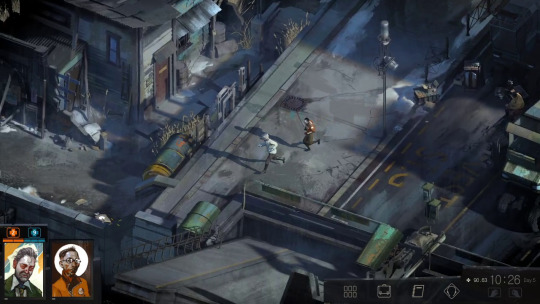
A major part of the game’s rhetoric is lost to those who do not have a dictionary that has been well tempered through copious forms of political jargon, coming from a various selection of manifestos, academic political analyses and some of the more famous philosophical works for the last century. I would go as far to say that some of the sentiments the game presents are absolutely impenetrable when it comes to wording. I’ll give you an example:
Heartache is powerful, but democracy is *subtle*. Incrementally, you begin to notice a change in the weather. When it snows, the flakes are softer when they stick to your worry-worn forehead. When it rains, the rain is warmer. Democracy is coming to the Administrative Region. The ideals of Dolorian humanism are reinstating themselves. How can they not? These are the ideals of the Coalition and the Moralist International. Those guys are signal blue. And they're not only good -- they're also powerful. What will it be like, once their nuanced plans have been realized?
If you immediately recognized that it was about centrism, then congratulations – you are a lot smarter than me and probably everyone else around you. For you Disco Elysium is the perfect college-level textual experience for your Tuesday-night 1960’s poetry club. For the rest of humanity, it’s a bunch of gibberish. Flowery prose and poetics are riddled everywhere and you're never really sure what you're doing, what thoughts you're thinking or what's happening to you.
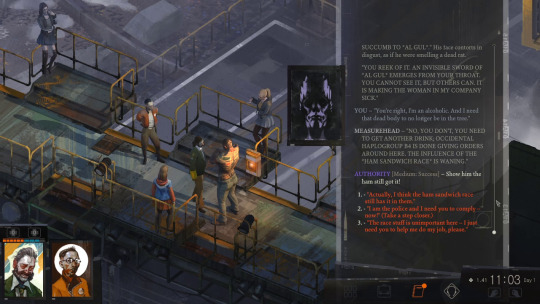
I mentioned briefly that the game tries to depict centrism as a form of moralism (a term which it prefers over the former). Even so, it presents centrism as less of an effort to hold multiple perspectives and act with a full and informed range of understanding, but rather as the stereotypical “fence-sitting” argument, where no decision can be made now, and progress can only be obtained through a slow, incremental process. While on the surface, it would seem so – as a self-proclaimed and passionate centrist, I cannot help but disagree with the outsider view that the game seems to be promoting, favoring critique of the right and an emphasis towards the left side of the political compass (making small but insignificant jabs towards both throughout). Contextually, the game’s developers Studio ZA/UM, have displayed a clear favor of the political left in their public appearances, which may explain this somewhat skewed perspective. While it’d be lovely to go on about the politics of ideology, it’s better not judge the contents of the game based on the developers’ ideological affiliation, but rather on its own merits.
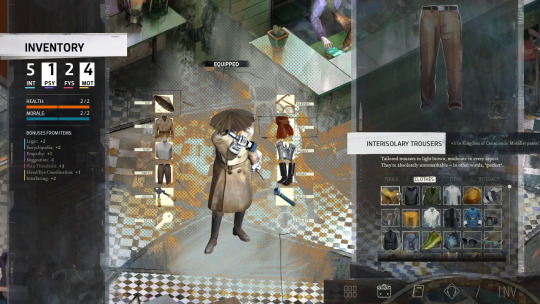
Considering the amount of reading one needs to do, I would hesitantly say that Disco Elysium is part RPG, part choose-your-own-adventure visual novel. I say RPG, because of the aforementioned brick walls, inhibiting progress in a way that no immersive sim ever would, as there would be multiple ways to get the same information, which is sadly not a thing Disco Elysium does well. The sheer volume of the text is also a cause for some, I would suppose, aesthetic concerns about the game. Graphically, the game is stunning with its unique painterly style, but it often values it over function, namely in having the UI serve little to no purpose, as Kim and your portraits take up the entire bottom left of the screen. At the same time the dialogue panel is put on the far right side of the screen, even though two thirds of it are spent zoomed in on some 3D models doing their idle animations, instead of having the text front and center, as the thing you will be most likely looking at for 90% of your time with the game. Other technical issues include shadows being displaced from where they should be, especially on stairs, as well as being incredibly jagged for a game that doesn’t really have high hardware requirements and very little real-time lighting, but all of this is frankly unintrusive, compared to the cramps in your neck from looking to your right all the time.
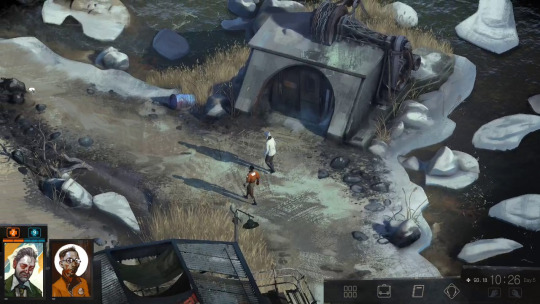
Every once in a while, you get to enjoy not having to read, as a select few scenes are entirely voice-acted by a talented cast. I am unsure, however, of the production team behind the recordings, as they seem to sound as if recorded in home studios with different microphones and sound processors. Other than that, the quality and range of the performances is wonderful, especially since it is coming from some lesser known actors in the industry.
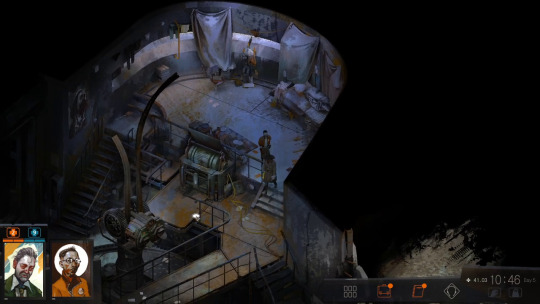
When it comes to sound, the game does a fantastic job of establishing a lot of varied soundscapes for an admittedly small plot of land. The music is ambient, droning and subtle in all the ways that make you not think about it, until you are sitting there listening to the soundtrack on your own time, remembering all the scenes that every piece of music has lifted from monotony. All of the tracks have this aging, somber tone to them, much like the world they are written for, making the music an unavoidable essential part of the experience, as you walk the fields of Revachol with the wind blowing and the small creek near you emitting a slight babble. The only downside is that the mixing of all these layers is often horribly unproportioned. Everything will be quiet, until some random intercom plays two straight minutes of loud white noise into your ear. Those parts are few and far between, but still leave a surprisingly large impression for an otherwise spotless execution of foley and ambience.
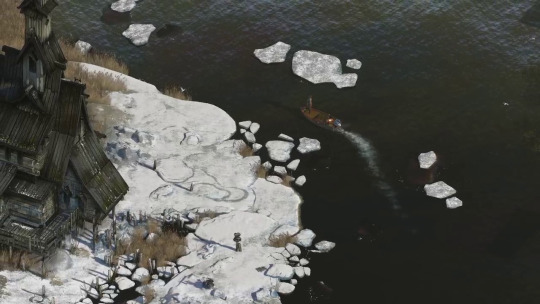
Overall, Disco Elysium is a full package. While not necessarily the game that I hoped it would be, it was still an enjoyable experience with an incredible main quest, memorable characters and side quests, elevated by wonderful sound design and fantastic ambient music, with writing that will be unparalleled for years to come. While it is not without its flaws, and some of them are quite major - it does what it set out to do with flying colors and is sure to appeal to a lot of people, who have been looking for an experience such as this. For me, however, it also represents a lot of squandered potential. It is by no means an ideal game – far from it; but I would still recommend you play through it for yourself, just to see where it takes you. It has a way of challenging you intellectually, that not a lot of games can pull off, especially nowadays. It is an admirable endeavor in tackling difficult topics, whilst also spinning an intriguing narrative that keeps you invested until the very end.
Score: 7/10
#game review#review#disco#elysium#disco elysium#harry du bois#kim kitsuragi#game analysis#game design#narrative#analysis#essay#revachol#oranje#politics#thoughts#systems#mechanics#game mechanics#RPG#visual novel#immersive sim#TTRPG#singleplayer#adventure#spoiler free#no spoilers
8 notes
·
View notes